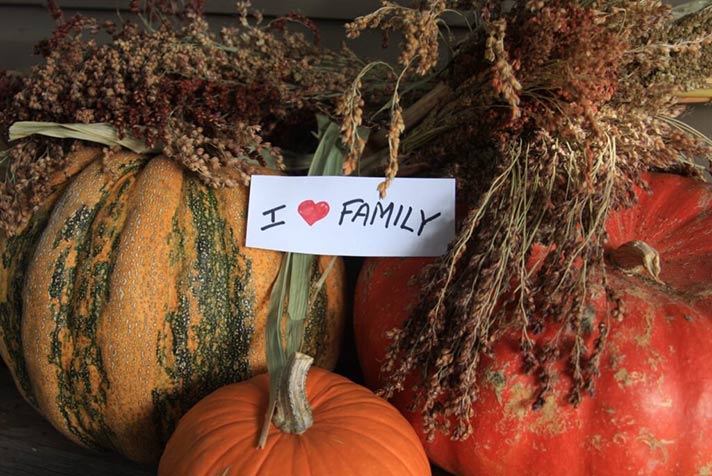Soul Matters – November 2021
The holidays often evoke more stress than gratitude, and this year promises to be a bit “extra” with Covid fears and vaccine wars added to the usual familial fracas. I hope this classic—read with cocktail in hand—will help you brave the onslaught.
It’s November, time for Thanksgiving gatherings and the annual viewing of one of my favorite movies, Home for the Holidays. I love this movie not just because of the terrific ensemble of actors, but because it depicts family holidays in such a realistic and comical light: the rifts and rivalries, the tensions and love, and the way we both know, and don’t know, the people we call family. If you haven’t ever seen it you really must, particularly if you are one of those people for whom the approach of the annual Thanksgiving gathering generates not gratitude but a vague, sinking sort of feeling accompanied by thoughts of a beach somewhere in Mexico.
I know exactly one person who loves getting together with family for the holidays. She tells of wonderful parents and siblings and spouses who actually like one another and who sit around laughing and drinking cider and playing Yahtzee. I don’t buy this story for one minute, but I nod and smile. During one memorable family gathering of mine, my mother looked at me across the table and remarked, “Kate, you look just like Meg Ryan with that haircut.” And then she added, “I hate Meg Ryan.”
For many of us, the holidays evoke more stress than gratitude, and for good reason. From the pleasures of holiday travel to the joy of being confined in a small space with people who haven’t gone to counseling, who drink too much or not at all, who carry grudges and have memories like elephants — it’s an ordeal. And still we gather, entertaining the vague wish that this time it might be different. We’ve had therapy. We can do this. We’re not going to let them get to us this time … and then they do.
Family is equipped like no one else on the planet to stir up all the psychic debris you thought you’d gotten rid of. They do this by treating you as they always have. They do it by seeing you not as who you are, but who you are to them. Before you know it, you find yourself transformed into a small and terrible person, a person you do not wish to be, a person you aren’t… or are you?
Family is tough, people. It just is. And I believe it is, in large part, because our family is here to facilitate our spiritual growth. Frequently they do this by being truly dreadful. It can take some serious spiritual jujitsu to maintain your mental and emotional equilibrium when you’re in the middle of the madness, much less recognize how you might learn and grow from it.
In recognition of this, I’d like to offer the following three mantras to help you keep your balance through the holidays — just in case that flight to Cancún is all sold out.
It’s not personal.
Nothing horrid that anyone says or does to you is about you: It’s about them. Conscious, loving people do not resort to vituperative comments, accusations, sarcasm, toxic tantrums, ice-outs and judgment. Such behaviors come from deep, untended wounds and reflect only the state of the person who inflicts them. Knowing this can help you to mentally and emotionally side step the caca that comes your way, and it might even allow you to feel compassion for the other person. Maybe. That’s extra credit.
Thank you, Sensei.
Our greatest lessons come from our greatest challenges. Patience, kindness, understanding, compassion and peace are only tested and strengthened by challenge. See your family member as an unwitting spiritual teacher, presented by the universe to test you. When your sibling/parent/in-law makes a snide or unconscious remark, you can say, “Thank you, Sensei.” It will really mess with them. Remember, just because someone passes you a plate of poo-poo doesn’t mean you have to accept it. “No, thank you, I’m paleo.”
Do you want to be right, or do you want to be happy?
I just love this Dr. Phil-ism. I like to say it out loud with a Texas accent. When things hit the fan and you’re itching to jump in, prove your point and win the battle (which you won’t, by the way, no matter how brilliant and right you are), it’s good to stop and ask yourself this question. Family disputes are dead-end traps. No one escapes unscathed. Choosing to be happy rather than right does not mean that you are giving in or giving up: it means you are choosing not to play the game. You are valuing your inner peace and well-being over your ego’s desire to engage. The real contest is not between you and them; it’s between you and you: between your ego and your higher self. When you lose the need to win, you’ve won the biggest victory of all.
That’s something to be grateful for.
KATE INGRAM, MA, SBC, is a life transitions counselor, Self-Belief Coach, and award-winning author who dreams of a Thanksgiving like the ones on the cover of a Pottery Barn catalog. (Remember those?) Find more information and support for the holidays at kintsugicoaching.com.

 KATE INGRAM, M.A., is a counselor, soul coach and author. Her first book, Washing the Bones: A Memoir of Love, Loss, and Transformation about her journey through grief and depression to spiritual awakening, was awarded a 2014 Nautilus Silver Medal and a 2014 Indie Book Award. To receive free monthly inspiration or to find out more about her work, please visit
KATE INGRAM, M.A., is a counselor, soul coach and author. Her first book, Washing the Bones: A Memoir of Love, Loss, and Transformation about her journey through grief and depression to spiritual awakening, was awarded a 2014 Nautilus Silver Medal and a 2014 Indie Book Award. To receive free monthly inspiration or to find out more about her work, please visit